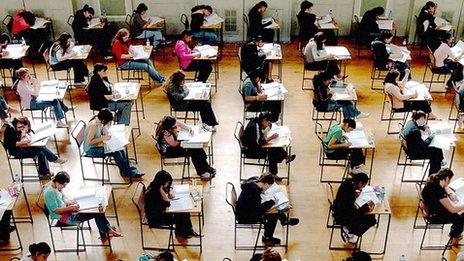Record levels of extra marks for exam illness
- Published

There were 374,000 exam papers where marks were adjusted
Almost 3% of this summer's exam papers were given extra marks because of pupils having problems such as a temporary illness, the highest level on record.
The figures from exam regulator Ofqual showed a 10% increase in such cases in England, Wales and Northern Ireland.
There were 374,000 requests approved for "special consideration" in marking this summer's GCSEs and A-levels.
The most common adjustment was worth 3% of the maximum exam mark.
The figures from Ofqual show that there was an even higher level of requests from schools for such special consideration - rising by 13% on the previous year to 415,200.
Only about 10% of these requests were rejected.
'Temporary injury'
The extra marks are allowed because an exam candidate has faced an unexpected disadvantage, which could range from a minor illness to something more serious, such as a bereavement.
The exam regulator describes the criteria as "temporary injury, illness, indisposition or another unforeseen incident immediately before or during the exam's period".
It could also allow a student to receive a grade reflecting their ability if they were unable to attend an exam.
The maximum adjustment is 5%, such as a close family bereavement. A "minor illness on the day of the exam" could gain a pupil an extra 2%.
As well as these adjustments for unexpected problems, Ofqual says that candidates taking a further 209,900 exam papers were given special access arrangements because of a disability or a medical condition.
These numbers of special access cases are falling, both in terms of request and approvals.
But the most common request remains asking for an extra 25% time for candidates, which was allowed for 107,400 exam papers.
Other types of help included using a reading device or someone to act as a scribe, such as for people with problems with their sight.
The exam report from Ofqual also shows a sharp year-on-year rise in penalties on staff for "malpractice" in exams, up 62% to 97, although this was lower than in 2011.
Mobile phone cheating
The most common type of staff malpractice was giving "inappropriate assistance to candidates" and the most common penalty was a written warning.
There were also 135 penalties for exam malpractice for schools and colleges, almost all of which were written warnings.
Among pupils, there were 2,590 penalties from this summer's exams - similar to last year. The most common form of cheating was using "unauthorised material", which usually meant a mobile phone.
But there have been declining numbers caught trying to use mobiles - down for the fourth consecutive year to 814 cases.